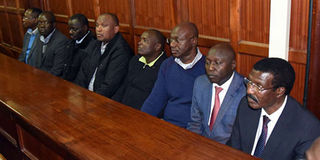The corruption purge has gained speed, only needs oiling, fuelling

From right: Ben Chumo, Ken Tarus, K.P Mungai, Joshua Mutua and Abubakar Swaleh at the Milimani Law Courts on July 16,2018. PHOTO | EVANS HABIL | NATION MEDIA GROUP
What you need to know:
- The multi-billion-shilling Galana Kulalu irrigation project, which has the potential to make Kenya much more food-secure but is dogged by mismanagement and scams.
- Another strategic tactic commonly used in some countries is to offer some suspects the opportunity of becoming state witnesses.
The war on corruption is gathering momentum fast. And expectations have changed dramatically. Many who thought it was just another well-worn publicity stunt are now more convinced it is going somewhere.
Even President Uhuru Kenyatta and others who initially fostered the purge must be amazed how it has taken on a pace of its own.
It is spreading from one scam to another like a bush fire. Every day, some other scandal comes to light. This bout started with NYS part 2. Now it has enveloped Kenya Power, Kenya Pipeline, NCPB, National Irrigation Board (NIB), the National Land Commission and irregular sugar imports....
One issue that ought to be in the spotlight is the Health ministry’s failure to produce supporting data on additional equipment supplied — such as procurement, contract and progress information.
Another is the multi-billion-shilling Galana Kulalu irrigation project, which has the potential to make Kenya much more food-secure but is dogged by mismanagement and scams.
SH7 BILLION
This limping NIB-managed million-acre scheme with the potential to produce 20 million bags of maize per annum has so far gobbled up over Sh7 billion.
What next? Kengen? What about the host of dams and other construction projects that are being undertaken by various ministries and county governments? Undoubtedly more land scams will surface.
Corruption is one of the most insidious and pervasive diseases which eats away at everything in the whole fabric of the country and its society and makes life harder and harder for the majority of the population.
It is imperative to take a serious look at what needs to be done next to continue, indeed accelerate, this war on corruption. If we can reduce the vice significantly, its toll of cutting economic growth by two percent-plus will be correspondingly reduced.
Exposure is one thing; reducing it is a much tougher task. Assembling the relevant evidence is vital. I have argued before that the Director of Public Prosecution (DPP) has a capacity issue at the best of times. If that office is to competently put together watertight cases in these many prosecutions, then it must increase its capacity massively.
PROSECUTION
The task is awesome. The prosecution has lined up 43 witnesses in NYS II. It is starting to receive significant capacity and skills support from even other governments, including the United States.
Its forensic investigations capacity must be boosted by those entities that have a sound reputation in the field — such as the US Federal Bureau of Investigation (FBI) and the UK’s Serious Crimes Office.
It is necessary to get the forensic evidence so that such charges as ‘receipt of bribe’ are proved and convictions secured and we avoid the vague and inadequate ‘abuse of office’.
Next, there is a need for more court prosecutors. The country has a surfeit of advocates.
Why not tap into this? This not only sorts out another resource issue but taps some of our best legal brains for prosecution rather than for the defence!
Another strategic tactic commonly used in some countries is to offer some suspects the opportunity of becoming state witnesses.
ANTI-CORRUPTION TRIALS
The consolidation of anti-corruption trials in Nairobi with high-profile cases being heard in the High Court is a move in the right direction. But Chief Justice David Maraga needs to assign a team of bright incorruptible judges and magistrates to hear the cases.
Next, the government ought to be clear on what the penalties for corruption are.
The Proceeds of Crime and Money Laundering Act 2017 covers much of this area but it also needs to be reviewed.
The overall aim is to raise the price of corruption much higher so it serves as a deterrent. One muted suggestion is that assets twice the value of the amounts lost in corruption should be retrieved from the convicts.
AUDIT PROJECTS
There are two additional arrows that should be added to the anti-corruption bow. One is the need for an independent audit of all major projects.
In conjunction with this, the moratorium on new projects by President Kenyatta makes sense and should be adhered to.
Last but not least, let us get away from the notion that the graft purge is aimed at any individual or entity.
It is aimed at making Kenya a cleaner, better country for all. If any of those charged are associated with President Kenyatta, his deputy William Ruto or, indeed, any other leader, then, as the former has said, they should carry their own cross.
Mr Shaw is a public policy and economic analyst. [email protected].





